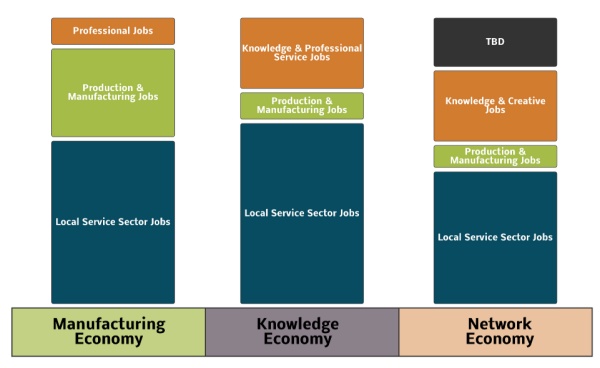An optimistic description of the Network Economy...
…with just a few weak spots.
According to a study on COVID-19 and the Future of Work (July 2020), economies undergo major restructuring when three developments converge: new methods of harnessing energy, new modes of transportation, and new means of communication.

The First Industrial Revolution took place thanks to the introduction of steam power, trains, and the telegraph and cheap print.
The current Industrial Revolution is the fourth, and is driven by the availability of distributed renewable energy, the electrification and possible automation of transportation, and the Internet of Things(IoT). All this should lead to transform “entire systems of production, management, and governance” by means of “exponential growth of innovation driven by new combinations of technologies in the physical, digital, and biological spheres.
The Network Economy
The outcome of the Fourth Industrial Revolution should be a new economic model called Network Economy, in which people work together across time and distance by forming potentially vast decentralized networks, developing direct marketplaces for the services and products they create.
In such an economy, information and ideas would be increasingly widely, instantly, and inexpensively shared, reducing reliance on traditional corporate structures.
The Network Economy and the Knowledge Economy that preceded it are both driven by the creation of knowledge and ideas.
The Knowledge Economy began as a primarily technical endeavor, highly STEM-focused, with much of its economic value generated through the design and production of technology and the use of this technology.
In contrast, the Network Economy will be driven by both creative, imaginative, and technical inventive work that increasingly leverages information technology in its inspiration, production, and distribution.

The figure above portrays the anticipated job composition of the Network Economy in comparison to preceding economic eras, with a diminished proportion of local service sector jobs, a larger share of knowledge and creative jobs, and the emergence of a new set of occupations that are yet to be defined.
And now, the weak spots
The Seattle study correctly concludes that “Whether the coming Network Economy is a democratized, resilient, and adaptive economy will depend on having adequate infrastructure, a workforce that is prepared to take part, and networks being accessible… This means that the telecom and electrical grids are robust enough to handle demand and that everyone has the necessary digital literacy skills, digital tools (e.g., computer and Internet access), and opportunities to participate in the economy."
That is true. However:
- What is growing exponentially these days is not exactly “innovation”. All too often, it is just tech, morphing into unregulated banking, hidden by plain, unnecessary crap like this, or this
- Creation and unexpensive sharing of new knowledge and ideas? This is an age based much more on ridiculous IP/copyright restrictions and increasingly centralized, corporate-controlled distribution of content. Not less
- Then there is the biggest weakness, that is the whole “driven by creative, imaginative, technical inventive work” part. There are two serious black holes in that diagram above about the “anticipated job composition of the Network Economy”:

One is an actual black hole, that is that black box not-so-implicitly declaring that, if the goal is full employment and/or social stability, a lot of jobs remain “To Be Defined” even theoretically. The other, better hidden black hole is the assumption, or desperate hope, that creative jobs will be a) enough, and b) accessible by the same people displaced by automation, before they starve. Reality, however, is that creativity is scarce by definition, and that such a “mass reskilling” (what an ugly word) is “demographically and culturally impossible for the current generations”
If it wants to happen, Network Econmy has better be quite different than certain studies imply.
Who writes this, why, and how to help
I am Marco Fioretti, tech writer and aspiring polymath doing human-digital research and popularization.
I do it because YOUR civil rights and the quality of YOUR life depend every year more on how software is used AROUND you.
To this end, I have already shared more than a million words on this blog, without any paywall or user tracking, and am sharing the next million through a newsletter, also without any paywall.
The more direct support I get, the more I can continue to inform for free parents, teachers, decision makers, and everybody else who should know more stuff like this. You can support me with paid subscriptions to my newsletter, donations via PayPal (mfioretti@nexaima.net) or LiberaPay, or in any of the other ways listed here.THANKS for your support!